“As I share with you my journaling process and how it came to be, one of the key takeaways is there is not a right or wrong or a “proven” method to get you to journal. Journaling is an extremely personal thing that the process should and does vary from person to person since God made us all unique. The methods might change but the why behind journaling is the same. It helps you to process what is going on in your life and understand what you have gone through so you can learn from the past and be intentional about your future. A mentor of mine has told me “Greg you want to know the difference between a successful person and an unsuccessful person, the successful person made more mistakes.” Although that is true, I believe there is more to it, that successful person learned from their mistakes.”
Journaling is the best way to learn lessons from your life!
I have yet to meet what I would qualify as a highly successful person (someone that lives an intentional life and feels fulfillment) that does not have the practice of journaling in their life. I encourage you to try it for 30 days and if you have not seen a major change in your life then give it up. Try different methods until you find the one that works best for you. My method is never done evolving, I just made changes to it just 8 months ago to add daily soul check and stress numbers. In going through my process, you will see what parts you like and what works for you then you can create the process that works best for you. Lastly, I will walk you through why I do each part so you can decide what works best for you.
My Process
The Journal
It starts with selecting the type of journal. I use a blank paper journal, which this year I opted to move to a Remarkable paper tablet.
I changed to Remarkable because it gave me all the feel of paper and limited distractions (no email, internet search, or calendar) but also easy to carry years’ worth of journals with me instead of a bookbag full of journals.
Prior to the Remarkable I used the Gallery Leather Large Leather Journal (Ruled) – 9.75″ x 7.5″ in black custom with my name, the year and volume number (I use about 1 a quarter). I use this because a friend of mine bought me one and I liked it. I liked the aesthetics, the feel of the paper, the spacing of the lines. I also like the idea of having these on a bookshelf and if my children want to read about my life they can. I plan to print out the remarkable pages to do the same.
Why paper?
This was a fight for me. I used to be all electronic method (like Doogie). I loved using the Evernote App to search dates and key words to look back on my journals. However, there were several problems for me with this method.
The first was consistency. For example, if I missed three days, I would just journal on the 4th day and never go back and review the missed three days. With a paper journal that is blank I cannot bring myself to skip the days I missed and come back later because I would not have the room. (I have replicated this with the Remarkable templates I have built out). This became an even bigger problem with weekly and monthly reviews because if I missed them, I would never go back and do them. With paper, I need to go back and do them before I can journal about today.
The second was I needed to be in front of a computer to type out my notes. This made it hard to do on demand. It’s hard to sit on a laptop in bed or carry a laptop on a rainy hike.
Third and most importantly it made it hard to disconnect. Part of the beauty of journaling is giving your mind space to think freely. I had to be in front a computer and not think about checking email or looking up something on Wikipedia. It’s hard to take chunks of time with no distractions with a machine made of distractions.
Lastly, I have learned the act of writing out my thoughts on paper is more effective than typing out my thoughts. My thoughts process is smoother and I seem to go deeper and process a lot more. I am not sure why, but I know it’s a very apparent difference for me. It really helps when it comes to listing my goals and weekly routines I write out.
Why blank instead of a formatted or prompted journal?
I like the ability to change my journaling as I learn what works, when you use a formatted journal, you cannot make changes. For example, this year I added a daily soul check and stress check, this is not possible if you are limited on space. I have changed the things I track daily and with a formatted I can not do this. I know I will make tweaks this year because I am never done working on improving my process.
The other big problem for with a formatted journal is that it limits the amount of space to process. Somedays my journal entry is 4 sentences other days its 4 pages, I don’t want to constrain myself to the space allotted. If I want to work through something, then I should.
Picking out a journal you like and want to use will increase the likelihood of you journaling, but just getting started is the most important. Remember, you can always make tweaks and changes in the future.
Daily Journal Entries
This is the question I get most often about journaling, what do you write about? The short answer is whatever is on my mind. I have tried prompt questions and other methods that did not work. I do not like being told what to think (I am a textbook enneagram 8) and find that prompt questions do not allow me the space to let my mind wander and think deep. What I have settled on is starting with retracing my day.
As I go throughout the day, I write out my thoughts, any actions from my goals or habits, notes from people I have met with and insights I have learned from them. I write quotes and scriptures that have spoken to me. As I am going through my day, I try think about what I was grateful for. I try to be vulnerable, open and honest with myself so I can learn.
I will write down things that are bothering me or conversations I want to and/or need to have with someone. I will write down things I am doing that bother me, for example, not eating right or not exercising. I write down things that bother me from other people’s action to examine why it bothers me, examine if I do that to others and work to let it go. I write down questions for God. I will write down things I want to do in the future and why. Its my time to explore my mind. This is why I like a blank space, because I want to let me mind be free and see where it ends up.
As I write I put stars in the margin as I write to highlight areas I want to reflect on when writing my weekly review. These include
- Markers/Notable Events
- Gods Voice
- Lessons
- Quotes
- Scriptures
In addition to writing out my thoughts, I do a daily soul check and stress level on a scale of 1-10. A soul check is a qualitive daily measure of how I feel. 1 would be depression and a cry for help whereas 10 would be one of the best days of my life.
Stress is how I am measuring the stress level I am feeling. 1 being no stress and 10 being I might have a breakdown.
Whatever you end up doing, explore different methods to find what works best for you but I encourage you to at least write whatever is one your mind, whatever you feel God is saying to you and where you are at with progress on who you want to be.
Here is a sample entry of a short day. You can see how I format with a star for God’s voice, a notable event, a quote, and a lesson. To be clear not all days have stars. This is also a shorter entry and a made-up entry to give you an idea. What it doesn’t showcase is me talking about something I am dealing with because that takes a few pages.
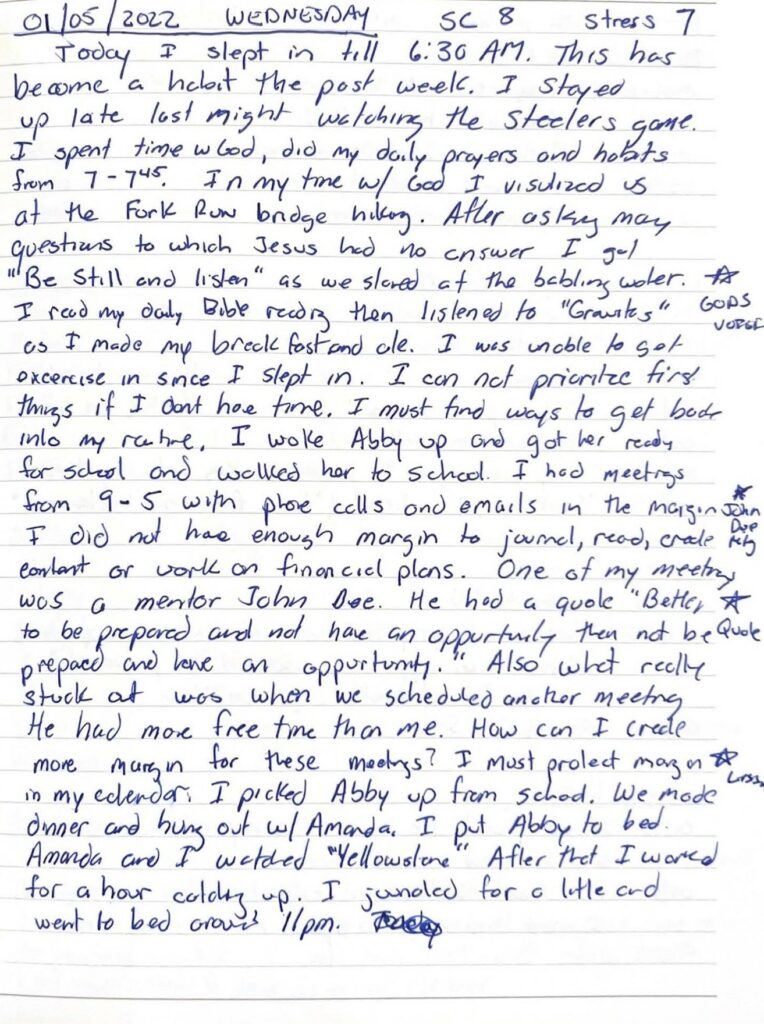
Weekly Reviews
Once a week, typically Sunday evening or Monday morning, I review my prior week (I do Monday-Sunday) and what has happened and where I am at. This has been the part that has taken me years to get right.
I have added and removed many different things over the years based on the intentional life I want to live. This is based on my vision and goals. You should tweak this to track the things you want to and need to track. This weekly review is the part of my process that takes the most time but is worth all the investment. I believe this is something you cannot afford to make part of your life. I have gleaned more value from this part of the process than any other.
It also should be noted that I track more things than this in the Evernote app like each week that includes where we go to church, vacations, time on our boat, how many times I use a club, how many times I have skied, books I have read along with a book report for each book and other things I want to know how often I do. These things are season or yearlong logs that help me evaluate those areas and create KPIs of my life to be more intentional. These will often still show up in my journal entries but I often want to access this data on demand on my phone.
In addition to my log, I use eMoney and YBAN app to track personal financial KPIs, the LifeCylce app, MyFitnessPal, Garmin, and Fitbit to track physical KPIs. These will often show up in the journal or are used to create information in my journal.
I start my weekly review directly below my Sunday journal entry (If I do it Sunday afternoon, I leave plenty of room for anything that might come up Sunday evening).
The areas I track are in order:
- Markers / Notable Events – I include the date with a small explanation. These are any events that have happened that I want to remember. For example, my daughters first time skiing, PITT winning ACC championship, a disagreement with a friend or about a family trip. e.g. 12/05/2021 Trip to Charlotte with Jason and Pitt wins ACC
- Ways God Spoke to Me – I try to spend alone time with God daily. I use a process I learned from my good friend, Andrew Reichert, that I will discuss in another blog. I will write down the date with a small explanation of how God spoke to me. Also, if I feel a theme for the week, I will include a small paragraph on what God is speaking to me about. I put the date and what I heard. e.g. 12/28 “Focus on the now, leave the future to me” visualized Jesus and I hiking up a mountain as we looked at the horizon or 12/27 “step by step.”
- Things Working this Week – I list all the things I am doing well based on what I want to achieve and the life I want to live. These vary greatly from week to week and month to month.
- Things Not Working – I list all the things I am doing poorly with based on what I want to achieve and the life I want to live. These vary greatly from week to week and month to month. Be honest here.
- Lesson Learned – I include any lessons I have learned from life or mentors here. I may go several weeks without any entry, or some weeks have a lot. I still write the header out to remind me to do it.
- Notable Quotes/Scriptures – I include any quotes I have read or heard as well as any scriptures that spoke to me this week. I may go several weeks without any entry, or some weeks have a lot. I still write the header out to remind me to do it.
- Scores/ Tracker – This has changed a lot over the years. These are the KPIs (Key Performance Indicators) of my life. I score myself on a scaled of 1-7 for 7 days in a week. For example, if I exercise 5 times, I will give a 5. If I feel like my Faith was where I wanted to be every day, it would be a 7. This is gleaned from my daily entries. After filling these out I will compare to prior week and put an arrow up or down next to each on indicating if it’s trending up or down.
- These are the leading indicator KPIs for my life
- Leader – This is my #1 role in life. See https://www.beratungadvisors.com/blog/defining-your-roles for more.
- Father – This is my # 2 role in life
- Husband – This is my #3 role in life
- Faith – How is my relationship with God?
- Bible Reading – Have I read my daily assigned Bible reading?
- Reading – Have I read from a book daily outside the Bible?
- Mornings – Have I got up before 5:30 and done my daily routine?
- Exercise – Have I worked out?
- Eating Healthy – Have I eaten healthy 80% of the time and tracked it?
- Going to Bed – Have I gone to be before 10 PM?
- Finances – Have I been intentional with my financial resources?
- Budget – Have I followed a budget or spent without looking at it?
- Tracking Habits – I track many habits daily on the Habit Hub app, have I tracked them today and completed over 80%?
- Journal – Have I journaled each day? I have not missed a day of journaling in several years, but I will sometimes get behind and journal several days later. When its not as fresh you do not get as good of results.
- Prayers – Did I do all 5 categories (see below) and not felt rushed and prayed at least 3 times throughout the day?
- Soul Check (this is an average from the daily numbers) – See above, on scale of 1-10
- Stress (this is an average from the daily numbers) – See above, on scale of 1-10
- These are the leading indicator KPIs for my life
- Stats – These are the lagging KPIs in my life. I get these stats from my Fitbit and eMoney. These are the areas that matter to me based on my yearly goals. You will want to tweak these based on what you are trying to do. I believe these should be 7 or less. I also place the prior week’s results and a column for the difference. They have changed as my goals changed.
- Resting HR
- Steps
- Weight
- Savings
- Debt
- Sleep Time
- Average Wake Up
- Summary – This is a paragraph or several giving my thoughts on the week. When you have gone through the above exercises its amazing what you learn about that week.
Here is an example of what this would look like.
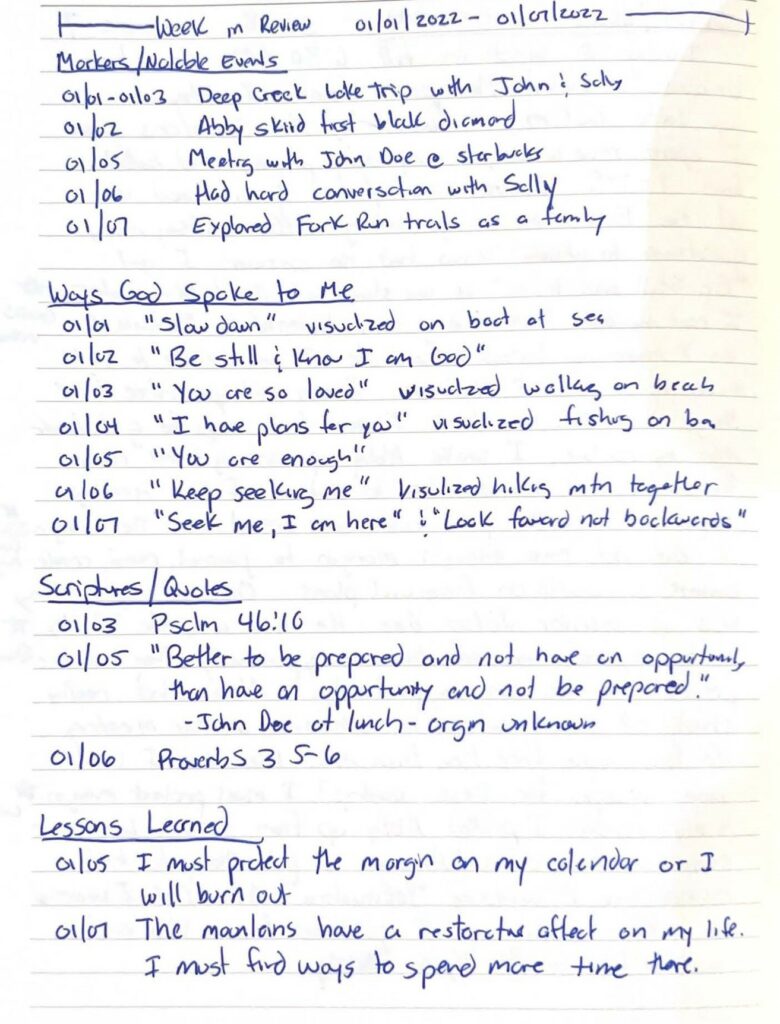
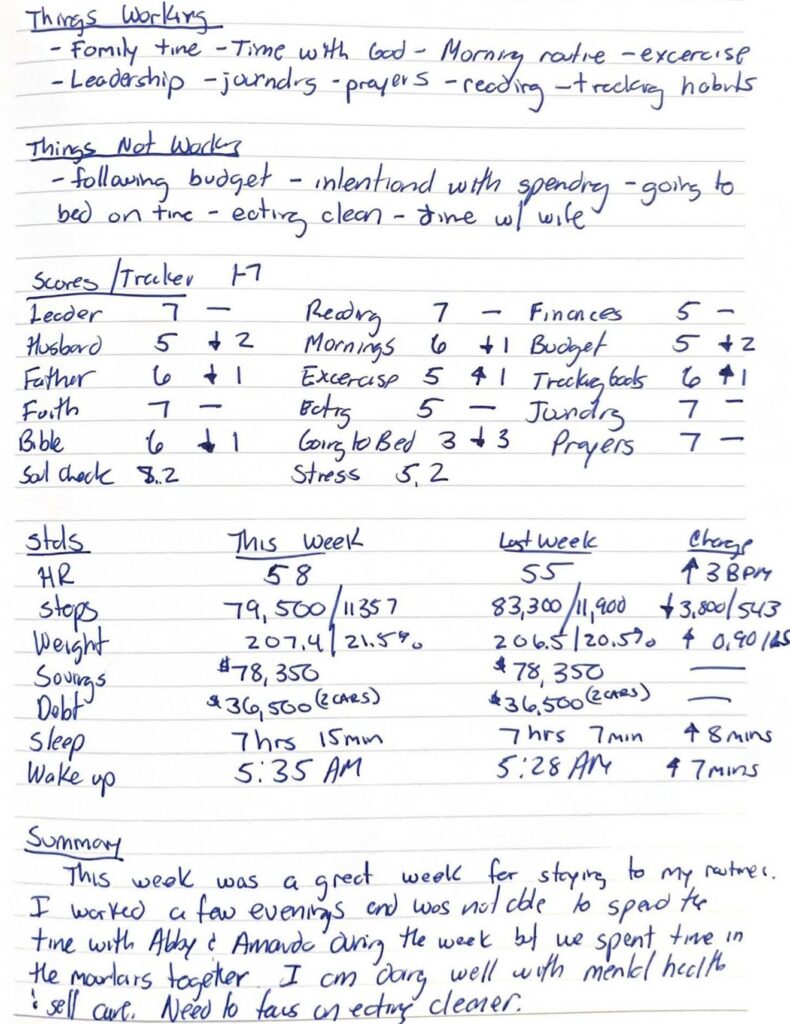
Monthly Reviews
All I do here is pick a sticky note on my 4 weekly reviews to act like a bookmark and then flip back and forth aggregating that data on monthly basis. The only part of the process that is different than my weekly review is for my scores/tracker part where I have to take out a piece of paper and do math. If I scored Leader as 7,5,6,7 I would have to add them up and divide by four giving me a 6.25.
Monthly Updated Daily Routines
I used to do these weekly for years and it became too much. Instead, I moved to write these out once a month during the monthly review which I did most of last year. Now that I use a remarkable, I only write this out once a year and sections that change like praying over 5 different clients each week, I erase only that part of the list and update it monthly while doing my monthly review. If you are going to use a paper, I suggest only quarterly rewriting these. Although I may only rewrite these once a year, I then read them daily.
These include in order:
- Daily Prayers
- Praise/Adoration
- Gratitude/Thanksgiving
- Forgiveness of Sins/Confessions
- Petitions/Ask
- Intercessions/Prayers for others (includes the following sections in addition to my family, our country, our leaders, and organizations I support)
- Requests
- 5 Clients weekly
- My Team
- My L3 Mastermind Group
- My Advisor Mastermind Group
- My Truth at Work Group
- My Advisory Board
- Lord’s Prayer
- Ten Commandments
- Luther’s Morning Blessing
- Apostles’ Creed
- My personal Why
- My personal Mission Statement
- My personal core values
- My personal Vision
- My roles in life
- Affirmation Statements
- My family’s Why
- My family’s Mission Statement
- My family’s Core Values
- My family’s Goals
- My three activities I am focused on
- My Top Ten Goals
- Beratung Mission Statement
- Beratung Core Values
- Beratung Vision
- Beratung Why
I also have a copy of these in the Evernote app in case I don’t have my journal with me but prefer to do these without electronic distractions. I make sure I review the Evernote version monthly as well.
Mid-Year Review
This takes me a full day. I simply take the monthly reviews and aggregate them. I use Microsoft Word instead of a paper journal. This is because I like to reference these often, make copies for my wife and a few accountability partners. It also helps to just save the document as new one to use as the basis for my end of year review.
The biggest difference between this and the monthly reviews is doing this all-in-one day makes me reflect and assess where you are at. Once I am done with this, I review my goals year to date and course correct my plan of action.
This also helps me with my end of the year process to have a lot of the work done.
For 4 years I have booked this full day on my calendar during my year end review process, to give me the space to go through this process and ensure that I completed it.
The past two years I have taken it a step further and booked a cabin in the woods to do this process. I find this helps me get the most out of this time. First, the act of going into the woods reduces the chances others will try to interrupt me as I do this important work. Second, being in the woods puts me in a great mindset, there is something that just puts my soul at peace. Third, having to drive and prepare to bring stuff forces me into a different mindset. Lastly, taking the time away from my family, my business and spending money forces me to be extremely productive and stay focused.
This is my year end review process that is part of my entire annual process for personal growth. I have spent 8 years tweaking this process to get it to where I am now (including a few this year), and I will continue to make tweaks in the future.
I take two full days in the woods to do this. I highly encourage you to take at least two full days and do this in one setting. You do not need to do it in the woods, but I find being in nature and alone is like adding gasoline to a fire for this habit. I also have added the act of jumping in a cold lake to start the day, but a 15 second cold shower will work.
I use the week between Christmas and New year’s. This fits into the yearly rhythms and prepares me to be ready for the new year.
The general process follows this pattern:
- Data Collection (I do this by journaling all year and my logs. This is collected prior to leaving)
- Data Review (I do this in part before but mainly this is done filling out the report. The act of reading through all the source documents)
- Data Assessment (This is done in writing the summary, highlights, and goal review. What does the data mean?)
- Reflection (This is done throughout the entire time but mainly in writing the summary, reviewing the finished report, and during hikes)
- Plan (Use what you have reviewed to create new goals, yearly calendar and focus for year)
If you found value in this blog, please share it with others so they can grow and develop as well. I would love to hear your method or things you do differently. Feel free to share feedback with me on LinkedIn.

More Than a Logo: The Meaning Behind Beratung Advisors’ Brand
Our logo isn’t just about branding–it’s a constant reminder of who we are, what we do, and why we do it.

5 Smart Moves to Make When the Market Is Down
Here’s the truth—market downturns aren’t just something to survive… they’re something you can leverage.
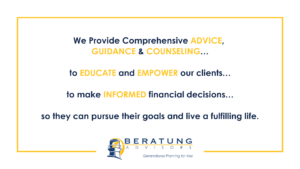
Empowering Informed Financial Decisions: The Beratung Mission
At Beratung Advisors, we all have one job: to execute on our mission.

Why Property & Casualty Insurance Is a Critical Part of Your Financial Plan
An important part of financial planning—one that often gets overlooked—is your property and casualty insurance.
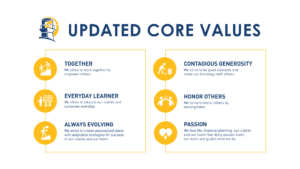
Refining Our Core Values: Making Them Clearer, Stronger, and More Actionable
At Beratung Advisors, our core values are the foundation of everything we do.

Make Your Vision Great Again: Why Clarity Wins
As leaders, we often assume our message is clear. We see the vision vividly, like a movie playing in our heads.

